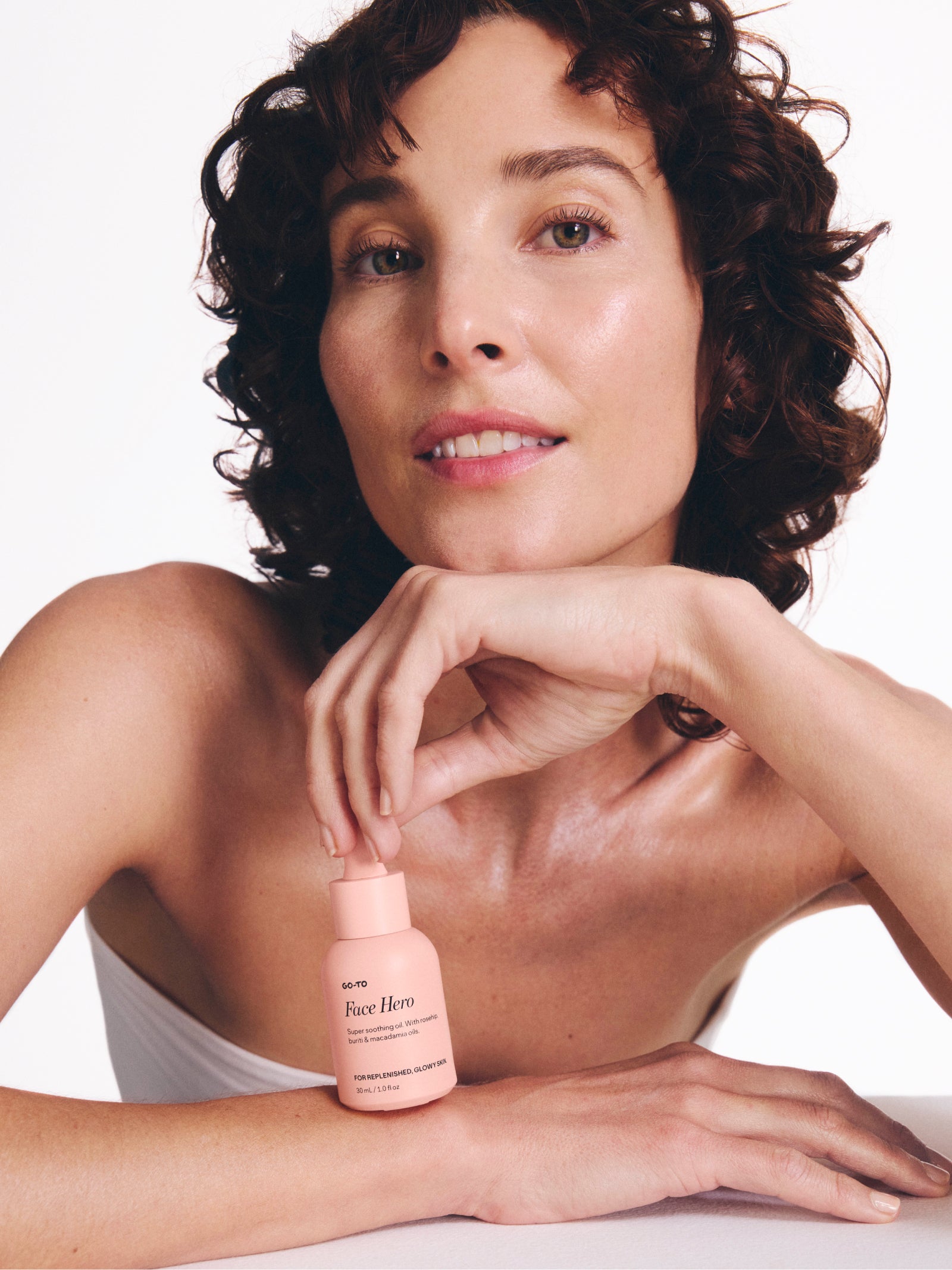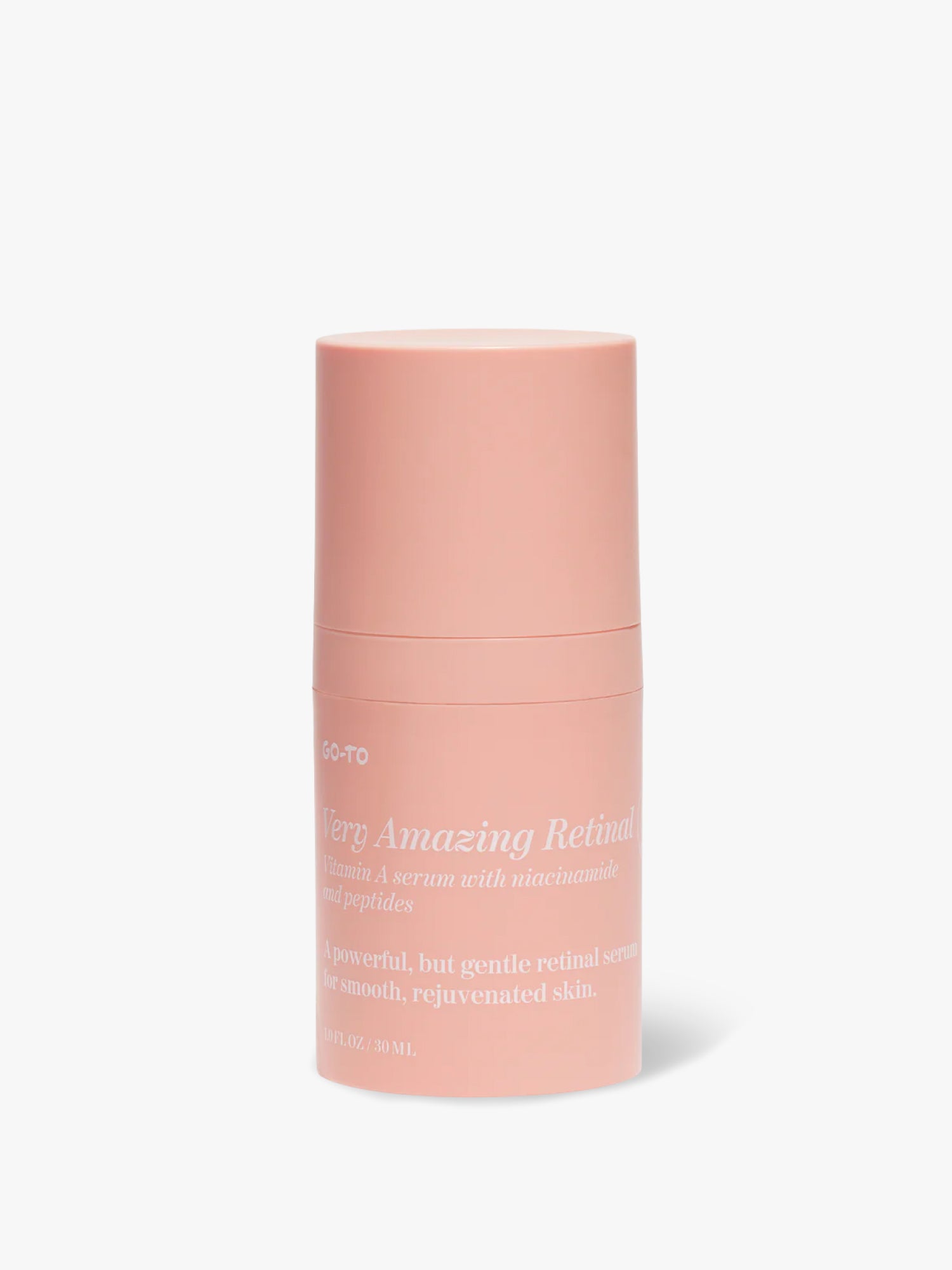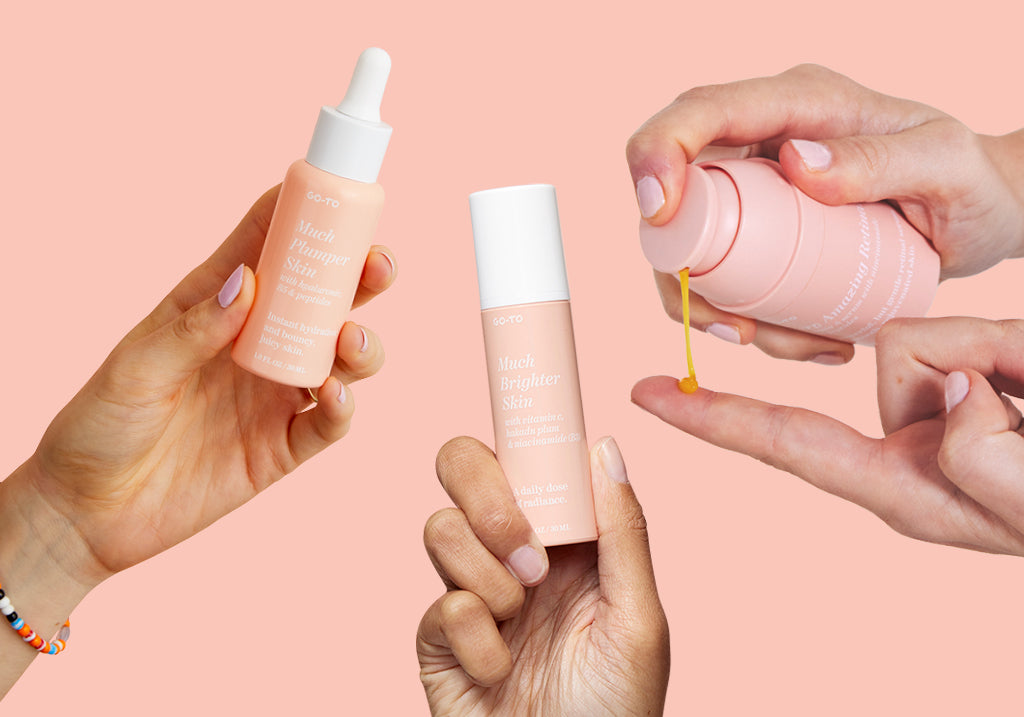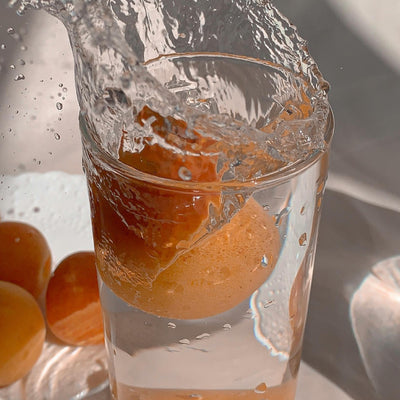Whether serums are your skincare ride or die, or a total friggin’ mystery, you’ll find everything you need to know about them in this ridiculously helpful guide.
Understanding Facial Serums
What Are Facial Serums?
Serums. Not to be mistaken with facial oils, a serum slips right on in between exfoliator and moisturiser in your routine.
Formulated to target specific skin concerns, serums are ingredient-packed, highly-concentrated, and molecularly small (this means they penetrate the deeper layers of the skin).
If you think of the core four of your skincare routine as doing what they say (cleanse, treat, moisture and protect), serums step in for the serious stuff. They’re formulated to tackle very specific skin concerns.
How Do Serums Differ From Moisturisers?
While some serums might be moisturising and some moisturisers might tackle certain skin concerns, the two are very different. Here’s how the two skincare staples differ:
How they feel
Serums tend to have a thin, runnier texture than a moisturiser. For a quick history lesson, the word serum literally gains its name from the ancient prefix “ser”. Meaning “to flow, run.” The lighter texture allows the serum to absorb deep into the skin, tackling certain concerns versus hydrating the surface.
What they do
Regardless of whatever acids, antioxidants, and additives have been included, moisturisers do a very specific task. They moisturise the skin. Some are very intense, others are nice and light. Either way, they’re first and foremost designed to create a barrier that locks in moisture and fights dryness. When it comes to serums, they target concerns like blemishes, pigmentation, fine lines, and sometimes even dryness.
When they’re used
Moisturisers should be used after your serums in your routine. The golden rule of skincare is to work from thinnest to thickest, as so helpfully explained by Go-To founder and overlord Zoë over here. Since, moisturisers leave a protective barrier, your serum won’t be able to penetrate the deeper layers of the skin if it's applied after.
Why Use Facial Serums?
If you’re just getting your skincare bearings or want to keep your routine short but sweet, you can probably give serums a pass for the time being.
But! If you’re in the pursuit of god-tier skin (a radiant glow, smoother fine lines, a brightened, even skin tone), a serum can help get you there.
Key Benefits Of Using Facial Serums
Since serums have a highly concentrated blend of ingredients, each is specifically formulated to target a specific bunch of skin concerns. So serums can:
Deeply Hydrate.
If you’re experiencing dehydration (dullness, texture, tightness), your instinct might be to load on the moisturiser. But when it comes to our face—dehydration and dryness are actually two different concerns. Hydrating serums can penetrate deeper into the skin to sort out dehydration much more effectively than a moisturiser that’s focused on the surface. .
Brighten and even skin tone.
Ingredients like vitamin C and niacinamide help boost your glow for a brightened and even skin tone. By boosting collagen production, removing dead skin cells, and stopping melanin production (the culprit behind hyperpigmentation), brightening serums help boost skin radiance and fight dullness.
Anti-age.
Serums packed with anti-ageing ingredients can help manage fine lines and improve skin elasticity for a more plump and supple complexion. Ingredients like peptides deeply penetrate the skin to boost collagen production, while vitamin A can help speed up new cell production to get rid of dead skin.
How To Choose the Best Facial Serum For Your Skin Type
While we’ve gone over how to find the right serum for your skin concern (psst! over here), your skin type is a whole different beast.
Consider skin type as the natural condition of your skin. Skin concerns, on the other hand, are the issues that affect your skin. There are five categories of skin types: oily, dry, normal, combination, and sensitive whereas skin concerns are much more open ended—ranging from acne to fine lines, and everything in between.
When it comes to choosing a facial serum, it’s important to look for a product that’s designed for your skin type while targeting your skin concerns. So, if you want to fight acne and oily skin but you have extremely sensitive skin, a barrier-respecting, skin-clearing serum might be best for you over a heavy, intense serum.
Make sure the serum is designed for your skin type before you use it to tackle your skin concern. ‘Cos if they’re not compatible you're likely going to really piss off your skin.
How To Incorporate Serums Into Your Skincare Routine
The general rule of thumb for applying serums is to slot them in between your exfoliating step and your moisturising step. In some cases, you can even layer them to maximise their power but more on that over here.
TLDR: Since serums tend to be highly concentrated, always follow the directions. Certain ingredients can be harsh on the skin and don’t play well with other ingredients, or are just too intense for daily use.
Not all serums are for night AND day! Save retinal, retinoids, AHAs and BHAs for PM, and generally speaking, vitamin C is at its best underneath SPF/in the AM.
Remember! Always always finish your skincare routine with SPF. Serum or no serum. (But particularly, if you’re using a serum retinal that increases your sensitivity to the sun.)
Common Misconceptions About Facial Serums
Are Serums Only For Ageing Skin?
No, serums aren’t only for ageing skin. Thanks to their highly concentrated formulas, serums can target a bunch of skin concerns like acne, dryness, and hyperpigmentation.
But! We don’t recommend serums with active ingredients for tween or teen skin.
Can Oily Skin Use Serums?
Yes, oily skin types can definitely use serums.
There’s plenty of serums that have been formulated with skin-clearing ingredients to balance oiliness and tackle breakouts.
That’s your rundown on all things serums
Here’s a rapid fire of things to remember:
-
If your skin is typically well-behaved and there are no major skin issues you’re looking to tackle, you should have no issues skipping the serum step. Maybe just keep it simple with a nourishing face oil.
-
If you’re dealing with even more specific skin concerns such as dullness, pigmentation, dehydration, redness, premature ageing etc. etc., you could absolutely benefit from using a serum.
-
With great serums, comes great responsibility. Always follow the instructions and check to make sure you’re not combining incompatible ingredients in your routine.
-
Pineapple does belong on pizza.
Much Brighter, Plumper Skin
Juicy and Radiant
This serum duo is essential for every face, every day. Much Brighter Skin brings glow in the AM, while Much Plumper Skin gives hydrates in the PM.















Comments